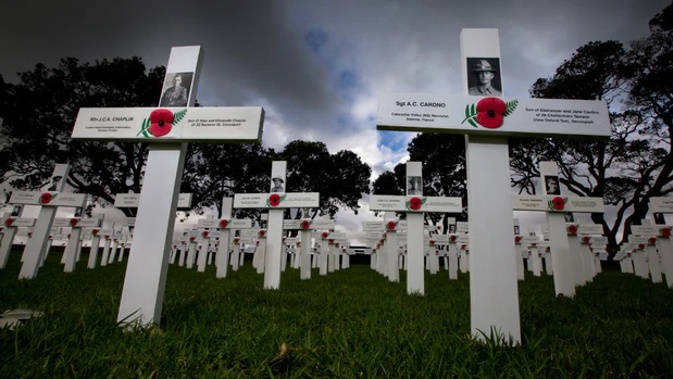
The nation's 180 RSA clubs will not survive unless they find a way to be relevant to younger people, says an internal report carried out for the organisation.
Defence Minister Ron Mark has endorsed the urgent need for the organisation to change and says it has made good moves towards doing so.
Yet Mark and the RSA concede more needs to be done to ensure the organisation is meeting the needs for which it was created - support and welfare for those who serve New Zealand.
The Royal New Zealand Returned and Services Association was set up in 1916 by soldiers returning from the ill-fated Gallipoli campaign.
It now claims 182 local RSAs with around 100,000 members, having relaxed membership rules in recent decades to allow those who have never served in uniform to join.
The internal report by Christopher Hodson, QC was intended to probe structural issues within the organisation.
Instead, the report shows Hodson found members were concerned whether the organisation could actually continue to exist.
He said even though the concerns weren't part of his remit, he was compelled to report the comments because of "universal concern about the effect of the ageing process on the organisation, coupled with the need to increase younger membership".
/arc-anglerfish-syd-prod-nzme.s3.amazonaws.com/public/GDXQILBFKRDKLKQFH445IWB6UI.png)
Hodson wrote: "The key word here is relevance. To survive at all the organisation needs to demonstrate relevance to the community and to recognise and meet the needs of those whom its existence is designed to support.
"These issues present as uppermost in very many if not all minds."
The RSA's founding purpose was to provide support and welfare for current and former service personnel. It has struggled to maintain the function with contemporary veterans while keeping its traditional bricks-and-mortar clubrooms afloat.
Hodson said a project needed to be developed to resolve the issues and to include Mark, as Minister of Defence, and the Chief of Defence Force.
He said "the primary aim is the ensure the survival of the organisation".
The RSA's greatest difficulty is considered to be engaging with the 20,000-plus contemporary veterans, who have served in Bosnia, Timor, the Solomon Islands, the Middle East and Afghanistan.
/arc-anglerfish-syd-prod-nzme.s3.amazonaws.com/public/H5Y7G4ROYRB6TJMSQSWS2QF34M.png)
It isn't alone - Veterans' Affairs NZ has also stepped up efforts to connect with a group of service personnel whose coalition contemporaries are struggling with high levels of service-related emotional and mental injury.
Mark said he had made it clear to the RSA it needed to do more to serve the needs of contemporary veterans.
"The situation was not good. It was dire. All the indicators of failure were blinking like neon lights Las Vegas. Everyone could see them."
Mark, who committed $1 million in taxpayer funding to the RSA since becoming minister, said he believed the organisation had "turned a corner" and was heading in the right direction.
Innovations like the "Burnham hub", which put an RSA presence inside Burnham military camp, had proved an effective way of connecting with serving personnel, he said. It was being repeated at Linton camp near Palmerston North, and others where appropriate.
/arc-anglerfish-syd-prod-nzme.s3.amazonaws.com/public/DWIUTQW3FJAPVIUUYZAWJKIEUE.png)
He said more change was needed, even in simple aspects such as decor in clubs reflecting the Great War and World War II.
"There is very little evidence in decor, music, atmosphere that would encourage young men and women of the day to walk through those doors."
RSA president Barry Clark said the issue was recognised and pressing.
"We need to look at changing our offering. We ourselves have acknowledged this some time ago and have been working very hard with our RSAs over the need to change."
/arc-anglerfish-syd-prod-nzme.s3.amazonaws.com/public/ITLUEUA5HFBUZKPY7LOFBNBHWU.png)
Clark said the physical clubs would be a part of the organisation's future as it strengthened its support for those who had served.
"We need to acknowledge those who have served after Vietnam. Let us never forget we came from Gallipoli but let us also acknowledge those who are serving today."
A number of RSAs have financially collapsed across the country in recent years and most districts' annual reports record struggles to maintain patronage.
The Kerikeri RSA's recent annual report recorded the resignation of its president who did not want to "die in the saddle" as others on the executive had, and the drop in membership from 900 to around 660 people.
"What is the future of the RSA," its vice-presidents asked in the report. "Do we continue trying to get us back to where we were three years ago or do we have to relook at what we are doing?"
The report stated "we just cannot entice our members to use the club" despite lowering costs, setting up a darts club and running euchre evenings.
Take your Radio, Podcasts and Music with you









